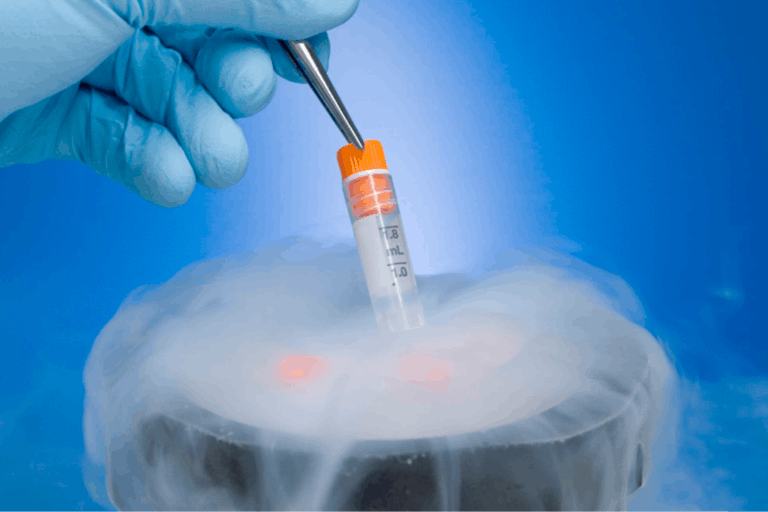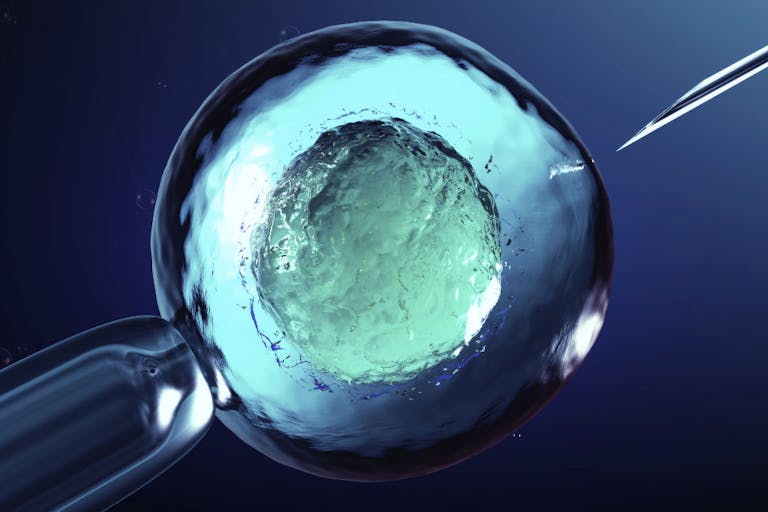
Hong Kong may throw out storage limits on embryos, sperm, and eggs
Angeline Tan
·
International·By Nancy Flanders
NHS pressured to pay for 'unproven' embryo screenings
Unlike in the U.S., the UK's NHS does not pay to screen embryos for chromosomal conditions like Down syndrome before implantation during IVF — but researchers are now pushing the NHS to allow the testing for women over 35.
Researchers are urging the NHS to allow women over age 35 to screen embryos for chromosomal conditions during IVF procedures.
PGT-A screening is common in the U.S., but in the UK, the Human Fertilisation & Embryology Authority says it can cause damage to the embryo and prevent successful development.
According to some researchers, PGT-A, which has led to the destruction of countless embryos in the U.S., is an "unproven, expensive, and possibly risky procedure."
Additional research shows that embryos labeled as having the 'wrong number of chromosomes' can 'self-correct.'
As reported by The Christian Institute, researchers in the UK connected with King's Fertility, an IVF treatment center, are calling for the NHS to allow women over age 35 to "screen out" embryos that have chromosomal conditions so that they can "conceive faster."
The screening, called preimplantation genetic testing for aneuploidy (PGT-A), checks embryos for "missing or extra chromosomes" like those found in people with Down syndrome, Trisomy 18, and Patau's syndrome.
The researchers' study, published by King's College London, King's Fertility, and King's College Hospital NHS Foundation Trust, involved 100 women aged 35 to 42 undergoing IVF. Fifty of them were given PGT-A testing, and each of their embryos considered aneuploid "were excluded from transfer."
The study found "that the PGT-A test showed a higher cumulative live birth rate after up to three embryo transfers with 72% in the PGT-A group versus 52% in the control group."
In the US, PGT-A has routinely been used in many fertility clinics. Embryos labeled “aneuploid" are often automatically thrown out because they are believed to have little to no chance of developing properly. However, evidence has shown that these embryos can actually self-correct.
As reported by The Cut, a New York Magazine site:
[R]esearchers have begun to report preliminary but stunning evidence that mammalian embryos with abnormal chromosomes have the remarkable ability in some cases to self-correct during early development, either by editing out cells that possess chromosomal irregularities or isolating them in the placenta, where they have no apparent effect on a developing fetus. As a result, these doctors believe that the widespread, long-standing conviction in medicine that abnormal embryos are destined to fail may be scientifically incorrect.
One study out of China showed that 77% of women undergoing IVF who participated in PGT-A testing had a live birth, compared to 81.8% of women who did not screen the embryos for chromosome number. The research, published in the New England Journal of Medicine in 2021, found that PGT-A screening did not increase the live-birth rate among women with three or more "good-quality blastocysts." It is an "unproven, expensive, and possibly risky procedure," according to StatNews.
“I do not suspect that clinics have been performing PGT-A for financial reasons in face of the realization of the questionable evidence supporting it,” said Hank Greely, chair of the steering committee for the Stanford Center for Biomedical Ethics. “Instead, the procedure has seemed that it should work, or perhaps even must work, and so help prospective parents realize their dreams. But expectations, and hopes, need to be weighed by evidence and, right now, the evidence for widespread PGT-A screening is, at best, weak.”
In the UK, the Human Fertilisation & Embryology Authority (HFEA) has said that PGT-A can cause damage to the embryo and prevent him or her "from successfully developing." The testing can also potentially give the "wrong result."
In the last 20 years, “viable, healthy embryos have been thrown away in the bin and, with that, you’ve lowered the pregnancy rates of hundreds of thousands of women,” Sebastian Mastenbroek, a clinical embryologist at the Center for Reproductive Medicine at the Amsterdam University Medical Centers, told STAT. “That’s shocking.”
Live Action News is pro-life news and commentary from a pro-life perspective.
Contact editor@liveaction.org for questions, corrections, or if you are seeking permission to reprint any Live Action News content.
Guest Articles: To submit a guest article to Live Action News, email editor@liveaction.org with an attached Word document of 800-1000 words. Please also attach any photos relevant to your submission if applicable. If your submission is accepted for publication, you will be notified within three weeks. Guest articles are not compensated (see our Open License Agreement). Thank you for your interest in Live Action News!

Angeline Tan
·
International
Angeline Tan
·
Analysis
Angeline Tan
·
International
Bridget Sielicki
·
Issues
Nancy Flanders
·
International
Cassy Cooke
·
Pop Culture
Nancy Flanders
·
Issues
Nancy Flanders
·
Human Rights
Nancy Flanders
·
Pop Culture
Nancy Flanders
·
Politics
Nancy Flanders
·